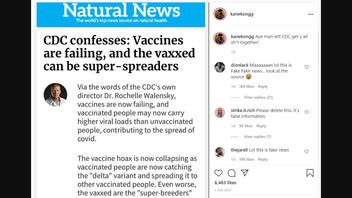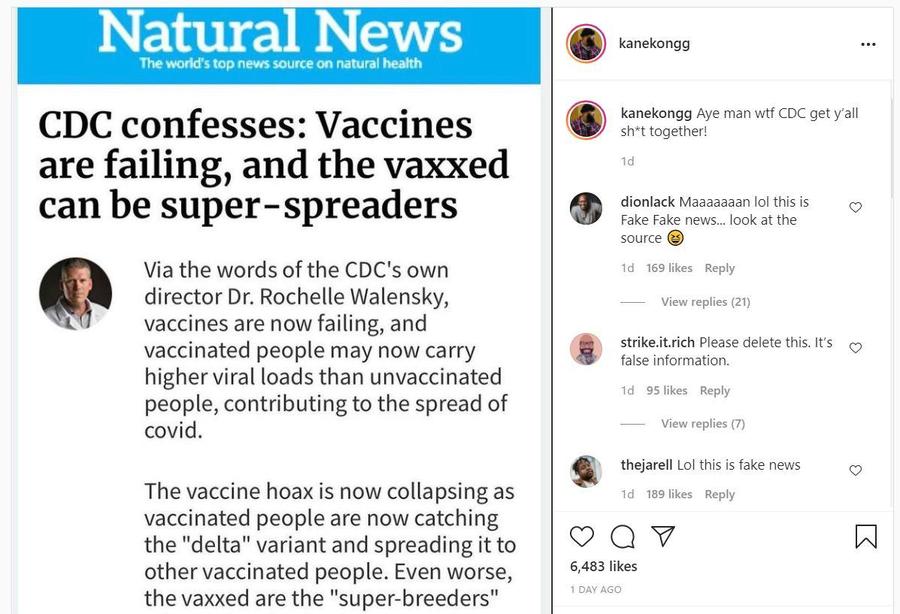
Did the United States' public health agency say vaccinated people are "the super-spreaders" of COVID-19? No, that's not true: Although discoveries about the delta variant will continue to change knowledge about it as scientists learn from its rapid spread, the Centers for Disease Control and Prevention (CDC) had not, by August 2, 2021, declared vaccinated persons to be "the super-spreaders" of the infection. Any person infected with the delta variant can spread it, even vaccinated persons with a so-called "breakthrough infection" and it appears to be more transmissible than earlier variants. The director of the Centers for Disease Control and Prevention (CDC) on Friday, July 31, 2021, shared rough results of a study of the July 4 weekend delta variant outbreak in Provincetown, Massachusetts. That study indicates vaccinated people infected with the delta variant can carry as much viral material as unvaccinated people infected with the delta variant.
The claim appeared in an August 1, 2021, Instagram post (archived here) published on the Kanekongg account under the title "CDC confesses." It opened:
Via the words of the CDC's own director Dr. Rochelle Walensky, vaccines are now failing, and vaccinated people may now carry higher viral loads than unvaccinated people, contributing to the spread of covid...Even worse, the vaxxed are the "super-spreaders."
Instagram users saw this at the time this fact check was written:
(Source: Instagram screenshot taken Mon Aug 2 at 17:52:42 UTC 2021)
The CDC on Friday, July 31, 2021, revised its guidance on masks, saying that field work at the sites of delta variant outbreaks indicates vaccinated people exposed to the delta variant can carry -- and spread -- as much viral material as the unvaccinated. The CDC did not say vaccinated infected persons carry more viral load than the unvaccinated. Here is the wording from the July 31 CDC statement:
Delta infection resulted in similarly high SARS-CoV-2 viral loads in vaccinated and unvaccinated people. High viral loads suggest an increased risk of transmission and raised concern that, unlike with other variants, vaccinated people infected with Delta can transmit the virus.
The CDC's report on the field work that supports the change in masking guidelines described the problem as follows:
In July 2021, following multiple large public events in a Barnstable County, Massachusetts, town, 469 COVID-19 cases were identified among Massachusetts residents who had traveled to the town during July 3-17; 346 (74%) occurred in fully vaccinated persons. Testing identified the Delta variant in 90% of specimens from 133 patients. Cycle threshold values were similar among specimens from patients who were fully vaccinated and those who were not.
Jurisdictions might consider expanded prevention strategies, including universal masking in indoor public settings, particularly for large public gatherings that include travelers from many areas with differing levels of SARS-CoV-2 transmission.
As to the Instagram's subjective statement that the CDC has "Confessed" that "vaccines are now failing." Lead Stories found no such statement by the CDC.
If you define success as 100% prevention of infection, all of the vaccines in use are "failing." Their effectiveness is less than 100% and some vaccinated patients still get infected (with lesser symptoms) in what are called "breakthrough" infections.
Perfect vaccines don't exist. Successful public health campaigns rely on drugs with less-than-perfect results. For the purposes of slowing the spread of the pandemic, the vaccines' prevention of early-variant infection in more than 90% of those vaccinated reduces the number of potential hosts, which slowed the spread, which reduced death and suffering in the population as a whole.
A new study in the New England Journal of Medicine suggests current forms of the COVID-19 vaccines may not be as effective against the delta variant, but are not 100% ineffective.
Lead Stories sent an August 2, 2021 email request to the office of the CDC's staff of spokespersons and will add their response, as appropriate, when we receive it.


















